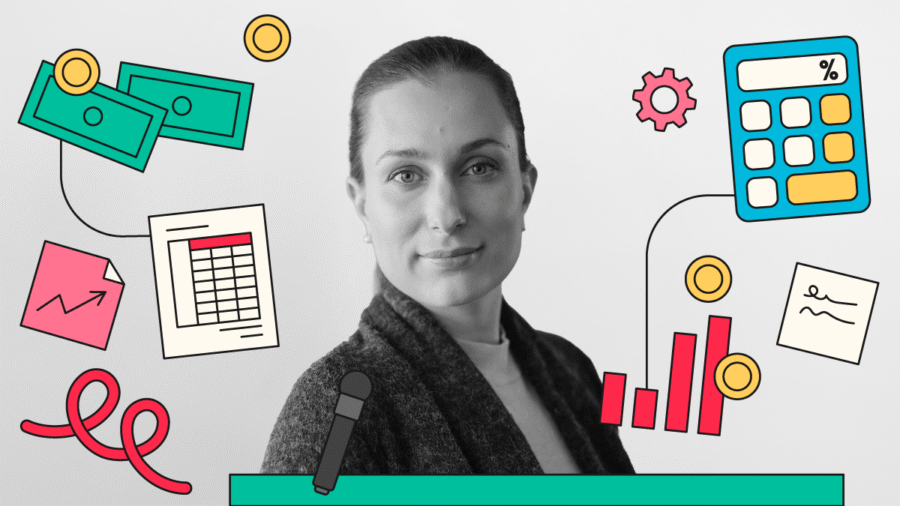
As CFO at Flo Health, a women’s reproductive health platform, Tamara Orlova is helping to shape the conversation around access, equity, and education in an often-overlooked sector. Orlova’s path wasn’t premeditated. It grew organically out of a consulting role and a strong sense of alignment with Flo’s mission.
She has a background in strategy, storytelling with numbers and making decisions under pressure. In this conversation, Orlova shares what she’s learned on the job, why she leans into change and how she builds confidence even in uncertain times.
How did you become a CFO?
I started out in consulting, where I was exposed to many different types of businesses. Over time, I became more hands-on with clients and eventually joined one of the companies I was working with. I didn’t plan to become a CFO from the start but, as I took on more responsibility and got closer to the operations of the business, the role came together naturally. Moving into that position felt like a continuation of the work I was already doing. It was not a big leap, but rather a gradual shift that made sense for me and the organisation.
What skills or traits does a good finance leader need?
Communication is essential. Finance leaders act a bit like a glue in the business. We sit at the centre, connecting different teams, gathering information, turning this into a clear business story, then feeding back insights. Outside of the CEO, the CFO is often the only person with a full view of what’s happening, why it’s happening and where the business is going.
You need to be comfortable having difficult conversations. Finance leaders sometimes have to deliver news others don’t want to hear. That requires being calm, transparent and clear so as not to lose trust.
Part of being a good CFO is picking up on how comfortable your CEO is with risk and knowing how to balance that. Whether the CEO is cautious or bold, the CFO’s role is to complement that and bring steady, well-reasoned judgement. Strong analysis matters, but so does asking the bigger question – are we doing the right things and are we doing them consciously?
What excites you most about your role?
I really enjoy the pace of growth and change. I love working in an environment where things are constantly evolving. At Flo, we are moving quickly and that brings a lot of energy. It keeps me motivated and challenged. I also like learning and figuring out new things, which this role allows me to do every day. Being in a space that’s growing and changing makes the work more dynamic and rewarding.
What’s the biggest challenge facing your sector at the moment?
One of the biggest challenges is the lack of knowledge around women’s health. A lot of people still see it mainly through the lens of fertility, without recognising the full picture, including hormonal health and how it affects day-to-day wellbeing, long-term health and quality of life. It’s a huge area that has historically been overlooked and, even now, doesn’t always get the attention it deserves.
This limited understanding exists not just in the public conversation, but also in how women perceive their own health. Expectations can be much lower than they should be and that’s something I’d love to see shift. There’s so much more to female health than many people realise.
The second challenge is related to prevention and the role of digital health services. There’s a growing awareness of how important preventive care is, but it’s still in the early stages. From government-backed health programs to insurers to healthcare providers, there’s a lack of clarity around how to support and implement digital solutions. Much of it sits in a grey area. People don’t always know what can be trusted, how to integrate new tools with existing systems or how to navigate the space overall. It’s evolving, but there’s still a lot of work to do.
What single thing would make your job easier?
To be honest, luck plays a role. A good CFO at a company that is performing well will always look stronger than someone doing a great job at a company that is struggling. Being in the right place at the right time can make a big difference. That said, strong fundamentals and good decision-making are still essential, but it’s important to acknowledge that external factors matter too.
What’s the best bit of business advice you’ve ever received?
One piece of advice that has stayed with me is: train the ability to make decisions fast, because a decision made is usually better than no decision made. Making a decision, any decision, is often better than waiting too long.
At some point, you have to move forward, even if everything isn’t perfect. In business, especially in finance, you rarely get 100% certainty. Learning to be comfortable with that is important.
A key lesson is learning to move quickly. In a fast-paced environment, time matters. You need to be able to adapt fast and meet change, because waiting too long can hold the business back. Even if you don’t have all the answers, it’s better to make a decision and adjust later than to overthink and miss the moment.
Which book do you think every finance leader should read at least once?
Two come to mind and they’re quite different from each other. One is Good Strategy, Bad Strategy by Richard Rumelt. It’s a great book for sharpening your thinking. This book helps you step back and ask, “Does this actually make sense?” It encourages the kind of critical questioning that’s essential in a finance role.
The second is The Outsiders by William Thorndike. It looks at a group of exceptionally successful CEOs, some of whom came from finance backgrounds, and explores what made them effective. It’s especially relevant for CFOs because it highlights the traits that support strong partnerships between finance and leadership and how CFOs can help a company stay aligned in both strategy and execution.
What do you do outside of work to protect yourself from burnout?
I have a seven-year-old daughter and I spend most of my time outside of work with her. I think it’s the sweetest age. She’s becoming more capable and independent, already her own person and able to do so many things. I really enjoy being with her. It’s something I find genuinely pleasurable and a great way to reset.
I also like organising and planning, even in my personal life. It might sound similar to what I do at work, but it feels different when it’s for myself. That kind of structure helps me recharge and keeps me grounded.
What’s been your proudest achievement in your current role?
Feeling like I’ve helped to write a meaningful chapter in Flo’s growth story. It’s not one single thing – it’s a combination of many contributions over time. But I truly feel that I belong here and that I’ve played a real part in helping the company grow.
When I joined, Flo had a much smaller team. We’ve grown from around 100 people to 500 and the scale of change has been incredible. The most rewarding part is that it doesn’t feel like I just stepped into a role at an established company. It feels like I’ve grown with Flo, helping grow it from the ground up. That sense of belonging and being part of something meaningful really stands out to me.
If you weren’t a CFO, what would you like to be?
My current role just happened naturally, one step at a time. I can’t say I ever set out to work in finance – it wasn’t something I specifically pursued. It evolved and I followed where it led. I love what I do now, but if I had to pick something else, I’d probably go back to an early passion of mine.
When I was around seven or eight, I was absolutely sure I wanted to be a fashion designer. I had a little desk and a sewing machine in my room and I used to make pillowcases. When I managed to sew a dress for myself, I was so proud. Maybe if I ever take a break from finance, I’ll try to bring some of those memories back.

As CFO at Flo Health, a women’s reproductive health platform, Tamara Orlova is helping to shape the conversation around access, equity, and education in an often-overlooked sector. Orlova’s path wasn’t premeditated. It grew organically out of a consulting role and a strong sense of alignment with Flo’s mission.
She has a background in strategy, storytelling with numbers and making decisions under pressure. In this conversation, Orlova shares what she’s learned on the job, why she leans into change and how she builds confidence even in uncertain times.





